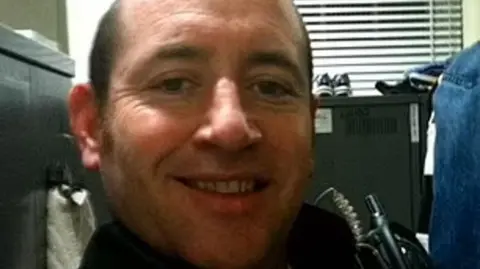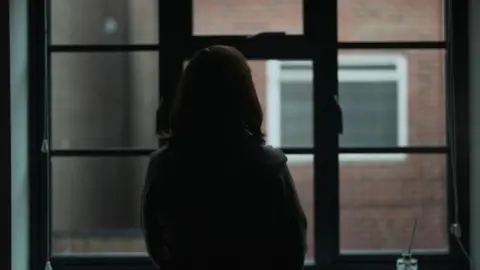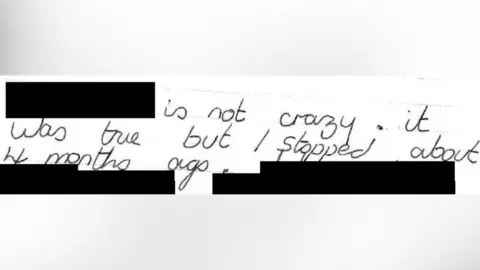Police failed to act on historic sex abuse claims against rapist Met officer
20 minutes agoDaniel De Simone and Jo AdnittBBC News Investigations

 Social media
Social mediaWiltshire Police were told in 2016 that serial rapist David Carrick had abused his youngest victim but failed to take action, the BBC can reveal.
Carrick, who was a Metropolitan Police officer, went on to rape five women before his arrest in 2021 and was jailed for life with a minimum term of 32 years in 2023. He was handed a further life sentence on Thursday for abusing his youngest victim for 18 months, beginning in 1989, when she was 12 and he was a teenager.
Speaking to the BBC, his victim Jo – not her real name – said the way her allegations were handled “was disgraceful”.
Wiltshire Police said the incident was “a clear case” of officers failing to properly investigate allegations made to them.
A Hertfordshire Police investigation into Carrick, who was originally from Wiltshire, began in 2021 after a woman came forward to say she had been raped by him.
He was eventually convicted of raping and abusing 12 women, who came forward to police once the inquiry began.
But the BBC can reveal that Wiltshire Police were told in 2016 about Carrick’s abuse of his youngest victim, who cannot be identified for legal reasons.
Another person – not Jo herself – contacted the force one night to report what happened decades before. When subsequently contacted by officers, the person said they had been drinking when they contacted police and had a poor memory about what happened years earlier.
But Wiltshire Police failed to contact Jo herself and closed the investigation before it even began. They knew that Carrick was a Met Police officer, but did not tell their London counterparts about the reported abuse.
Wiltshire officers also failed to search for Carrick in their own systems. Had officers done so, the search would have revealed he was already under investigation for a serious offence reported three days earlier.


Jo told the BBC the “whole way it was handled was disgraceful”.
She said that, had she been approached by officers in 2016, she would have told them everything.
“He’d have had five years of less offending if they’d spoken to me.”
She said Wiltshire Police should apologise to the women who were raped after 2016.
“If it was a member of the public, they would have probably done it a lot differently than a police officer.”
Jo wants Wiltshire Police to “take accountability” and make sure it never happens to anyone else, she said.
In a statement, Wiltshire Police “apologised unreservedly to the person whose report we did not initially investigate as we should”.
Two Wiltshire officers have since been found to have committed misconduct and given final written warnings.
Elsewhere, authorities had known about Carrick’s abuse of Jo since 1990, when an NHS psychologist interviewed her.
A letter from Carrick admitting the abuse was in his medical records, but police vetting didn’t uncover it. He went on to join the Met in 2001.
In his recent trial, the letter from Carrick was used as evidence.
The BBC has separately seen a letter from an NHS psychologist, sent to a local GP practice in1990 who had spoken to Jo about the abuse.
But there was no investigation into Carrick at the time.

 CPS
CPSIn a recent letter to Jo, the NHS has apologised for how the abuse was handled in 1990.
The letter says that “unfortunately, when you were seen in 1990 the organisations would not have had a strong safeguarding governance structure” and this is “sadly evidenced in your available medical notes.
“The abuse against you was not fully understood and your voice was not heard in the process.”
Referrals that could have been made – meaning to police and other bodies – “appear not to have been enacted”, the letter notes.
The letter then apologises for this “historical practice”.
Jo told the BBC the abuse in the NHS records should have been identified when Carrick joined the police, and he could have been prevented joining at all.
“He shouldn’t have been a police officer,” she said.
Jo said the recent BBC Panorama undercover investigation into Met Police showed a culture in which Carrick would have “fitted in like a glove”, and that she is alarmed by that.
Jo wants change and for women’s voices to be heard.
“Just don’t suffer in silence”, she said.
“Just keep talking. Keep telling people. If somebody won’t listen, go somewhere else.”
“Everyone should be a valued person. Everyone should be listened to.”